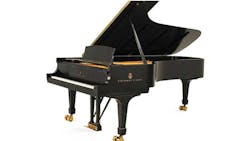Steinway Musical Instruments Goes Private in $438 Million Deal
NEW YORK - Steinway, which has built the pianos used by some of the world's greatest classical musicians for more than 160 years, on Monday said it was being taken private in a $438 million deal with private equity group Kohlberg & Co.
New York-based Steinway Musical Instruments, Inc., which owns the iconic Steinway & Sons piano brand, said Kohlberg will offer to acquire all the outstanding shares of the company for $35 a share, a premium of 33% from the average closing price of the firm's shares over the last 90 days.
Steinway said the deal would help it build its global business without diminishing the legendary quality of its pianos, renowned for their sound and touch.
"For over 160 years, Steinway's skilled manufacturing artisans have been crafting the world's finest musical instruments," said Kohlberg partner Christopher Anderson in a statement.
"Kohlberg's long history of collaboration to grow and expand some of the world's leading consumer brands makes us an ideal partner for Steinway to accelerate its global expansion, while ensuring the artisanal manufacturing processes that make the company's products are preserved, celebrated and treasured."
The agreement provides a 45-day "go shop" period during which Steinway can seek alternative proposals.
Steinway pianos, under the original Steinway & Sons name, are built in New York and Hamburg, Germany.
They have been used by some of the world's greatest musicians, including Arthur Rubinstein, Ignacy Paderewski, and Vladimir Horowitz, and are played by current luminaries Evgeny Kissin, Mitsuko Uchida and Lang Lang.
Steinway Musical Instruments, Inc. also controls a number of popular brands for other orchestra and band instruments, including Conn, Selmer, Leblanc, King and Yanagisawa.
The purchase by Kohlberg (not connected with takeover group Kohlberg, Kravis Roberts, or KKR) came after Steinway undertook a strategic review in 2011, initiated after the company received several proposals to buy its band instrument division.
The review weighed selling all or part of Steinway, but concluded that continuing as a publicly traded company was the best route to creating shareholder value.
Copyright Agence France-Presse, 2013
About the Author
Agence France-Presse
Copyright Agence France-Presse, 2002-2025. AFP text, photos, graphics and logos shall not be reproduced, published, broadcast, rewritten for broadcast or publication or redistributed directly or indirectly in any medium. AFP shall not be held liable for any delays, inaccuracies, errors or omissions in any AFP content, or for any actions taken in consequence.
